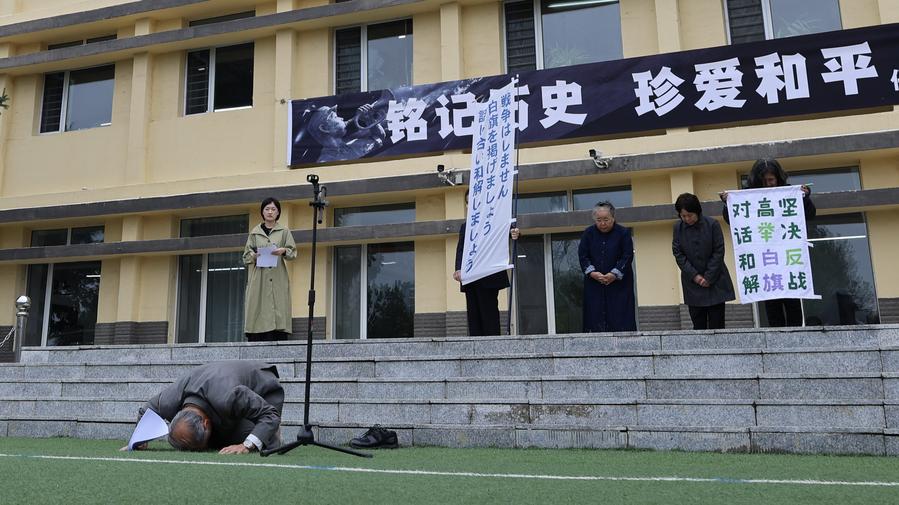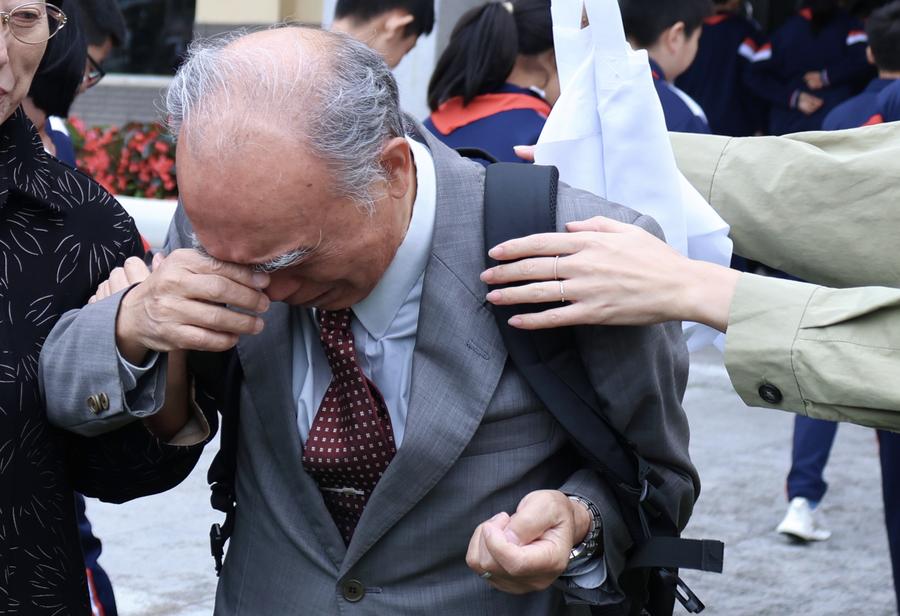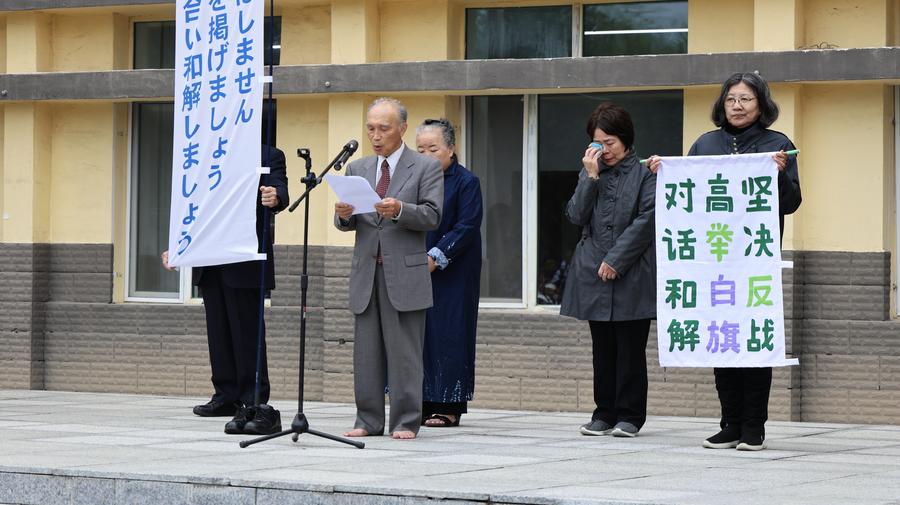


Kuroi Akio, descendant of WWII Japanese invader Kuroi Keijirou, removes his shoes and socks and kneels down to kowtow before the Chinese people in Gongzhuling, northeast China's Jilin Province, Sept. 14, 2024. (Photo by Tang Mingze/Xinhua)
CHANGCHUN, Sept. 17 (Xinhua) -- Under the Chinese national flag, 76-year-old Japanese man Kuroi Akio removed his shoes and socks and knelt down to kowtow before the Chinese people. In this way he sought to offer an apology on behalf of his father at a historical site in northeast China's Jilin Province, where Japanese forces once committed atrocities during the invasion of China.
Ahead of the anniversary of the September 18th Incident, Kuroi, along with eight other descendants of Japanese soldiers who invaded China, embarked on a five-day journey of remorse and apology.
On Sept. 18, 1931, Japanese troops bombarded the barracks and began the bloody invasion in China, foreshadowing WWII and making the country the first to resist fascism.
The Japanese army had deployed 1.86 million troops in China, accounting for more than 50 percent of a total of 3.58 million Japanese troops sent overseas. During the war of resistance against Japanese aggression that lasted until 1945, China suffered a total of 35 million military and non-military casualties, accounting for a third of the total casualties of all the countries in WWII.
Kuroi's father, Kuroi Keijirou, had participated in two separate campaigns in northeast China in 1932 and 1941. These campaigns included violent acts against civilians, something Kuroi Akio is determined to address and atone for.

Kuroi Akio, descendant of WWII Japanese invader Kuroi Keijirou, cries after attending an apology ceremony in Gongzhuling, northeast China's Jilin Province, Sept. 14, 2024. (Photo by Tang Mingze/Xinhua)
Walking through former sites of the Japanese military occupation, including the command headquarters and barracks, Kuroi reflected on the horrors his father's unit had inflicted.
"They carried out assaults on the farmers and residents of Gongzhuling City, depriving them of their lives and robbing their property. The actions of my father were inhumane, and as his son, I offer my sincerest apologies to the people of Gongzhuling. What he did can never be forgiven," Kuroi said.
Okayama Teruaki, 70, another member of the group, noted that the countless Chinese people who lost their lives to the Japanese military should have had the futures they had hoped for.
He emphasized that ignoring these innocent souls and attempting to find solace by "honoring" Japanese soldiers who died in the war is futile. The true way to "comfort the souls" is to acknowledge the invasion, offer sincere apologies and compensation, mourn the victims, and renounce war.
According to Li Suzhen, vice president of the Chinese and Japanese Oral History Culture Institute, Okayama's two uncles died in the invasion. After the war, Japan's disregard of the facts of invasion deeply disappointed Okayama, leading him to dedicate his life to anti-war activism.
Okayama used his position as a teacher before retirement to tell high school students in Tokyo about Japan's war crimes. His outspoken activism has resulted in multiple reprimands from the Japanese government.

Kuroi Akio, descendant of WWII Japanese invader Kuroi Keijirou, delivers an apology speech in Gongzhuling, northeast China's Jilin Province, Sept. 14, 2024. (Photo by Tang Mingze/Xinhua)
While they apologized at the site, the group members held white flags with characters that read "white flags against war, reconciliation through dialogue" in a poignant act of calling on the international community to remember history and cherish peace.
In addition to their acts of atonement, the descendants brought with them a trove of historical documents collected in Japan related to the Japanese invasion of China. These materials were presented to Changchun Normal University (CNU) to support academic research and deepen the understanding of this painful period in history.
Professor Zhang Xiaogang from the School of History and Culture at CNU said that the personal stories and testimonies shared by the group offer a new dimension to the study of Japan's war crimes.
"Their visit is a positive step towards shaping an accurate and honest historical memory for both nations," Zhang noted.
点击右上角![]() 微信好友
微信好友
 朋友圈
朋友圈

请使用浏览器分享功能进行分享
